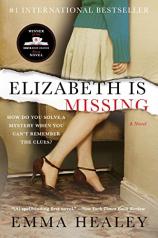Reading Group Guide
Discussion Questions
Elizabeth Is Missing

1. What interesting and complex narrative effects result from the narrator having such difficulty with her memory?
2. Consider the prominent image of summer squash in the novel. What connotations does it add to the story? What are the various effects of the repeated references?
3. What key details are introduced in the Prologue?
4. How does the consistent shift from present to past affect the telling of the story? How does the author transition between them?
5. In Chapter One, there are several allusions to Little Red Riding Hood. In what ways might this fairy tale be relevant to the story?
6. Carla, one of Maud's caregivers, often tells of horrible crimes she's read about in the news. What does this add to the novel? How does it affect Maud?
7. What is the difference between something or someone being missing, lost, or gone? Consider various points of view.
8. In what relevant ways does the war --- and all the lengthy separations it causes --- affect the people and relationships in the novel?
9. What is the importance and effect of "the mad woman" throughout the novel?
10. Consider Douglas and Frank. Both seemingly have moments of menace and kindness. In what ways are they similar or different?
11. In Chapter 10, Maud, having forgotten what room she was headed to, says, "I must be going mad." In what ways is she similar to or different from the mad woman?
12. What does the subject of Maud's childhood illness add to the story?
13. Throughout her life, but especially once her sister Sukey goes missing, Maud collects random, found objects. In what various ways do physical objects come to possess meaning or value?
14. Of what particular significance to the novel is the detail of Maud collecting "boxes full of disintegrating bees and wasps and beetles"?
15. At one point, speaking to Frank, Maud denies that she has secrets, but then admits to liking the idea. In what ways might secrets be important? How can they be unhealthy?
16. Late in the novel, Maud touches something of her sister's and says, "The contact makes it possible to breathe again." What is she experiencing?
17. What does Maud's granddaughter Katy bring to the novel?
18. Consider the Epilogue. What is the effect of ending the novel with the lyric swirl of Maud's receding memories?
Elizabeth Is Missing
- Publication Date: June 2, 2015
- Genres: Fiction, Mystery, Psychological Suspense, Psychological Thriller, Suspense, Thriller
- Paperback: 320 pages
- Publisher: Harper Perennial
- ISBN-10: 0062309684
- ISBN-13: 9780062309686








